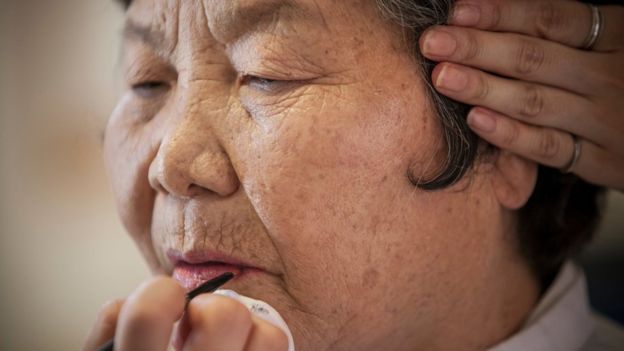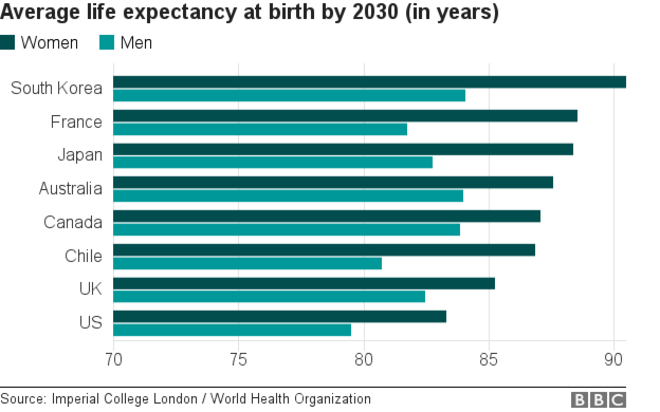한국 여자가 세계 최초로 평균 기대수명 90을 넘게 될 것이라고 한 연구가 보도했다. 런던왕립대학(Imperial College London)과 세계보건기구(WHO)는 산업화 된 35개 국가의 수명을 분석했다.
이 연구는 2030년에는 모든 나라의 사람이 지금보다 더 오래 살 것을 예측했으며 남자와 여자의 수명 차이는 대부분의 나라에서 좁혀지기 시작하는 것으로 예측했다.
이 연구는 노인층의 연금과 건강관리에 큰 변화가 있음을 발견했다고 발표했다.

Majid Ezzati 교수는 “한국은 많은 바람직한 것들을 가지고 있다”고 BBC News 웹사이트에서 말했다. 그는 또 “한국에서는 교육과 영양 같은 건강에 도움이 되는 혜택을 지역적인 차별 없이 거의 모든 사람들이 고르게 받고 있다. 지금까지 한국인들은 세계적으로 우수한 고혈압 치료를 받고 있으며, 이들의 비만율은 세계 최저다”라고 말했다.
이 연구의 자료는 한 때 장수 국가로 상징적이었던 일본이 세계 랭킹에서 붕괴될 것임을 예측했다. 현재 일본 여자의 기대수명이 세계에서 가장 높지만, 한국과 프랑스에게 뒤지게 될 것이고, 남자의 기대수명은 4번째에서 11번째의 나라가 될 것이라고 이 연구는 제시하고 있다.
미국은 선진국의 기대수명 중에서 나쁜 성적을 보이고 있으며 2030년에는 가장 짧은 기대수명을 가질 것으로 보인다. 이 연구는 미국의 평균수명으로 남자는 80세, 여자는 83세로서 멕시코와 크로아티아의 평균수명과 거의 같을 것으로 예측하고 있다.
“미국은 한국과는 거의 반대다”라고 Ezatti 교수는 말했다. 그는 “미국 사회는 국가 차원의 영향이 미치는 범위가 매우 불공평하다. 그 나라는 통괄적인 건강보험(국민건강보험)이 없는 유일한 국가이다. 미국은 기대수명의 성장이 멈추는 유일한 나라가 될 것이다”라고 말했다.

미국은 칠레에게 뒤처질 것이다. 칠레에서 2030년에 태어난 여자는 87세까지 살 것이며 남자는 81세까지 살 것이다.
2015년에서 2030년 사이의 영국의 평균 기대수명은 남자의 경우 79에서 82로, 여자의 경우 83에서 85로 증가할 것이다.
Lancet 논문집에 게재된 연구에 의하면, 남자와 여자 사이의 기대수명의 간격이 좁혀지고 있다. 남자는 전통적으로 건강하지 못한 생활습관을 가졌으며, 그로 인해 기대수명이 더 짧았다. 남자들은 담배와 술을 더 많이 했으며, 교통사고와 살인범죄를 더 많이 냈다.
그렇지만 남자와 여자 사이의 생활양식이 비슷하게 되고 있으며, 그들의 수명도 비슷하게 되어가고 있다. 증가한 수명의 많은 부분은 어린이의 사망 감소보다는 65세 이상의 증가에 기인하고 있다.
그 연구는 기상학자들이 일기예보를 위해 하는 방법과 비슷한 방법으로 수행되었다. 이 연구는 과거를 분석하여 미래를 예측하는 21개의 분리된 수학적 모델을 결합했다.
이 접근법은 기대수명을 변화시키는 모든 요인 – 흡연의 정도, 의료 혜택, 비만 유형을 간접적으로 고려하고 있다.
이 연구는 소련의 몰락이나 모든 암을 예방할 수 있는 획기적인 백신 개발과 같은 매우 예외적이고 예측할 수 없는 사건에 의해 예측을 크게 뒤엎는 경우를 제외하고, 모든 나라가 현제 상태로 발전하는 것을 전제로 하였다.
Ezzati 교수는 요약에서 “국가가 건강 체계에 투자하고 그 투자가 개개인에게 도달하도록 확실히 한다면 그 국가의 평균 수명도 확실히 길어진다”고 말했다.
kangokki@silvernettv.com
Original Text
Life expectancy to break 90 barrier by 2030
By James Gallagher Health and science reporter, BBC News website, 22 Feb. 2017
South Korean women will be the first in the world to have an average life expectancy above 90, a study suggests.
Imperial College London and the World Health Organization analysed lifespans in 35 industrialised countries.
It predicted all would see people living longer in 2030 and the gap between men and women would start to close in most countries.
The researchers said the findings posed big challenges for pensions and care for elderly people.
“South Korea has gotten a lot of things right,” Prof Majid Ezzati told the BBC News website.
“They seem to have been a more equal place and things that have benefited people – education, nutrition – have benefited most people.
“And so far, they are better at dealing with hypertension and have some of the lowest obesity rates in the world.”
The data also forecasts that Japan, once the picture of longevity, will tumble down the global rankings.
It currently has the highest life expectancy for women, but will be overtaken by both South Korea and France, the study suggests. Meanwhile, male life expectancy will go from the fourth highest to eleventh out of the countries studied.
US falling behind
The US also performs poorly and is on course to have the lowest life expectancy of rich countries by 2030.
The study predicts an average age of 80 for men and 83 for women – roughly the same state Mexico and Croatia will have achieved.
“They are almost opposite of South Korea,” added Prof Ezzati.
“[Society in the US is] very unequal to an extent the whole national performance is affected – it is the only country without universal health insurance.
“And it is the first country that has stopped growing taller, which shows something about early life nutrition.”
The US will be overtaken by Chile, where women born in 2030 will expect to live for 87 years and men for 81.
Between 2015 and 2030, life expectancy in the UK is expected to go from 79 to 82 for men and from 83 to 85 for women.
Men catching up
The study, published in the Lancet, also shows the gap in life expectancy between women and men is closing.
Prof Ezzati said: “Men traditionally had unhealthier lifestyles, and so shorter life expectancies.
“They smoked and drank more, and had more road traffic accidents and homicides, however, as lifestyles become more similar between men and women, so does their longevity.”
Much of the increases are due to improvements for the over-65s rather than reductions in deaths during childhood.
The study made the projections in a similar way to the methods used by meteorologists to forecast the weather.
It combined 21 separate mathematical models that analysed past trends to make projections into the future.
This approach indirectly takes account of all the different factors – smoking rates, medical advances, obesity patterns – that are changing life expectancy.
It assumes countries continue to progress as they are, so exceptional, unpredictable events equivalent to the fall of the Soviet Union, or huge breakthroughs like a vaccine for all cancer, would massively alter the forecasts.
In summary, Prof Ezzati said: “Places that perform well do so by investing in their health system and making sure it reaches everyone.“
Source from :
http://www.bbc.com/news/health-39040146
